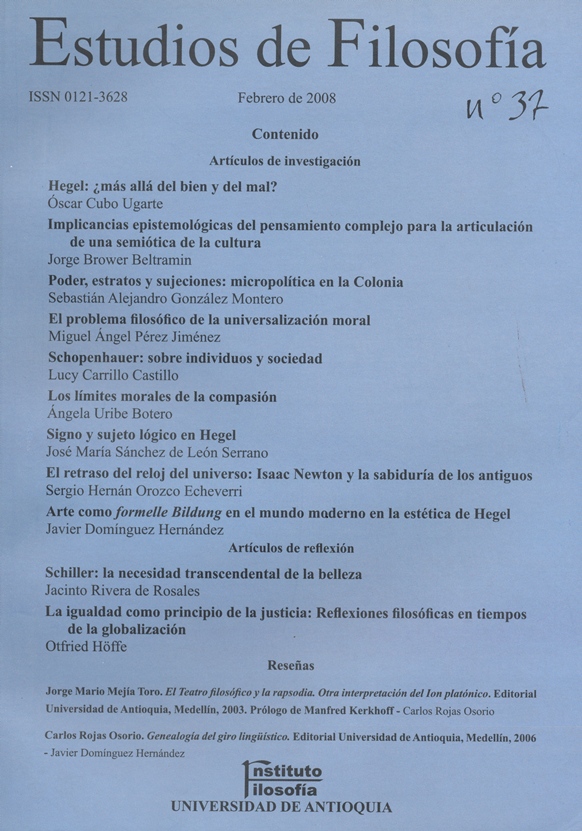Power, Stratus and subjections: micropolitics in Colonial times
DOI:
https://doi.org/10.17533/udea.ef.12723Keywords:
power, statements, Political Subjections, elites, layersAbstract
Emphasis is laid in this essay on the fact that the Historical Perspective of Foucault`s Mechanisms of Power serve to question the social processes that are at the base of the segmentations that operate within the Antioqueñan Community during Colonial Times. The hypothesis is that the Political Subjections of New Granada cannot only can be marked by means of the differentiation between “dominant elites” and “native slaves”, but that, rather, it is necessary to consider a horizontal distribution originated in economic, parental and legal differentiations. The first part of the essay shows that social differentiations in colonial times suppose an economic juncture related to the changes in the relations between the exchange of gold and its extraction. The second part establishes how System of Subjections and hierarchies are constituted by the genealogical ties of each individual. Following this, the ‘blanquedo’ is described as a legal form that has a powerful influence in the Antioqueñan community. Finally, in the conclusions, there is an account of the Political Subjection of Antioquia in terms of the processes of exclusion and inclusion.
Downloads
References
ÁLVAREZ, J. y URIBE, M. T. Las raíces del poder regional: el caso antioqueño. Editorial Universidad de Antioquia, Medellín, 1998.
AGAMBEN, G. Homo sacer: un poder soberano y la nuda vida I. Pre-Textos, Valencia, 1998.
ARANGO G. Genealogías de Antioquia y de Caldas. Imprenta Departamental- Colección Libros Raros y Manuscritos BBLA, Medellín, 1942.
COLMENARES, G. La economía y la sociedad Coloniales, 1550-1800. En: Nueva Historia de Colombia. Planeta, Bogotá, 1989.
CASTRO, S. La hybris del punto cero. Ciencia, raza e ilustración en la Nueva Granada (1750-1816). Pontificia Universidad Javeriana Instituto Pensar, Bogotá, 2004.
DELEUZE, G. Foucault. Paidós, Madrid, 1994.
DELEUZE, G. y GUATTARI, F. Micropolítica y segmentariedad. En: Mil mesetas. Pretextos, Barcelona, 1994.
FALS, O. Mompox y loba. Carlos Valencia, Bogotá, 1981.
JARAMILLO, J. Ensayos sobre historia social colombiana. Universidad Nacional de Colombia, Bogotá, 1968.
JARAMILLO, J. La economía del virreinato, 1740-1810. En: Nueva Historia de Colombia. Planeta, Bogotá, 1989.
FOUCAULT, M. Defender la sociedad. Fondo de Cultura Económica, México, 2000.
FOUCAULT, M. Tecnologías del yo. Paidós, Barcelona, 1996.
GROOT, M. J. Historia eclesiástica y civil del Nuevo Reino de Granada. BAC, Bogotá, 1953.
OCAMPO, A. J. Historia económica de Colombia. Tercer Mundo Editores, Bogotá, 1994.
ORTIZ, S. Colección de documentos para la historia de la Colonia. Nelly, Bogotá, 1965.
RESTREPO, V. Estudio sobre las minas de oro y plata en Colombia. Faes, Medellín, 1979.
Recopilación de las Leyes de los Reynos de las Indias. Tomo I, II y III. Ediciones de Cultura Hispánica, Madrid, 1946.
TWINAM, A. Mineros, comerciantes y labradores: las raíces del espíritu empresarial en Antioquia. Faes, Medellín, 1985.
WEST, R. La minería de aluvión en Colombia durante la época colonial. Imprenta Nacional, Bogotá, 1972.
Downloads
Published
How to Cite
Issue
Section
Categories
License
Copyright (c) 2008 Sebastián Alejandro González Montero

This work is licensed under a Creative Commons Attribution-NonCommercial-ShareAlike 4.0 International License.
Authors who publish with this journal agree to the following terms:
1. The Author retains copyright in the Work, where the term "Work" shall include all digital objects that may result in subsequent electronic publication or distribution.
2. Upon acceptance of the Work, the author shall grant to the Publisher the right of first publication of the Work.
3. The Author shall grant to the Publisher a nonexclusive perpetual right and license to publish, archive, and make accessible the Work in whole or in part in all forms of media now or hereafter known under a Creative Commons Attribution-NoCommercia-ShareAlike (CC BY-NC-SA 4.0), or its equivalent, which, for the avoidance of doubt, allows others to copy, distribute, and transmit the Work under the following conditions: (a) Attribution: Other users must attribute the Work in the manner specified by the author as indicated on the journal Web site;(b) Noncommercial: Other users (including Publisher) may not use this Work for commercial purposes;
4. The Author is able to enter into separate, additional contractual arrangements for the nonexclusive distribution of the journal's published version of the Work (e.g., post it to an institutional repository or publish it in a book), as long as there is provided in the document an acknowledgement of its initial publication in this journal;
5. Authors are permitted, and Estudios de Filosofía promotes, to post online the preprint manuscript of the Work in institutional repositories or on their Websites prior to and during the submission process, as it can lead to productive exchanges, as well as earlier and greater citation of published work (see The Effect of Open Access). Any such posting made before acceptance and publication of the Work is expected be updated upon publication to include a reference to the Estudios de Filosofía's assigned URL to the Article and its final published version in Estudios de Filosofía.















